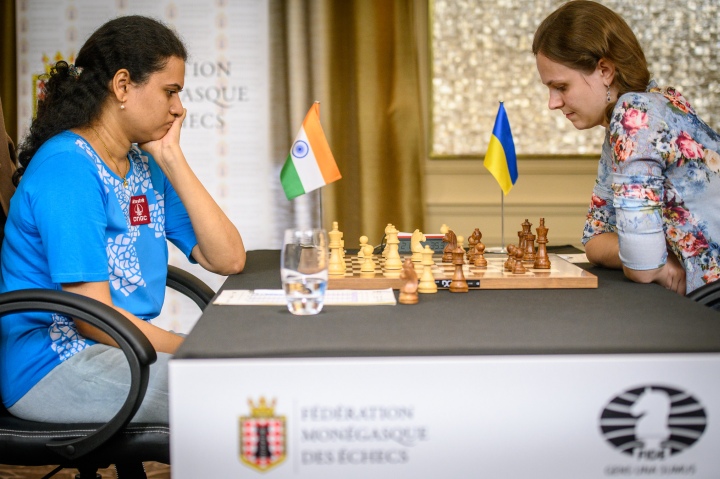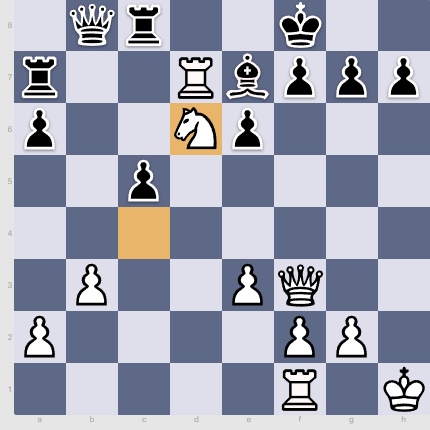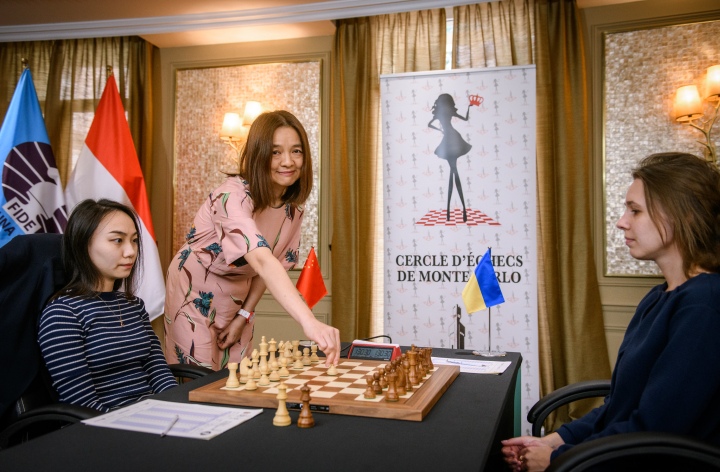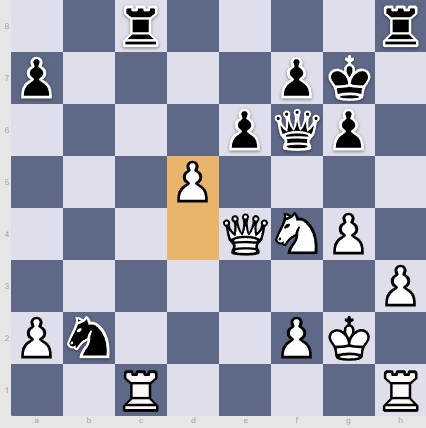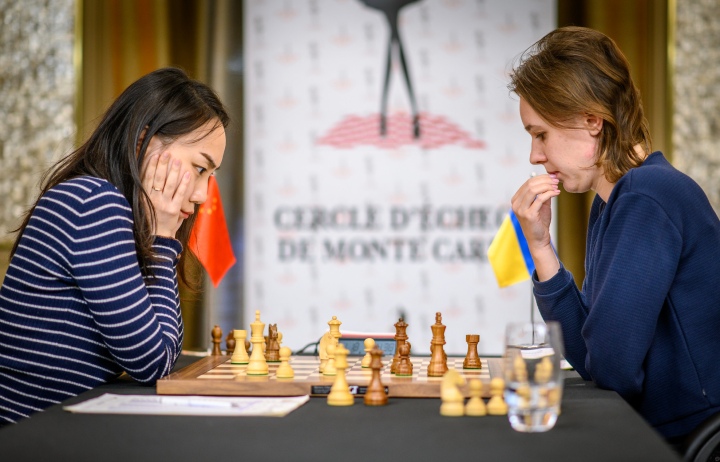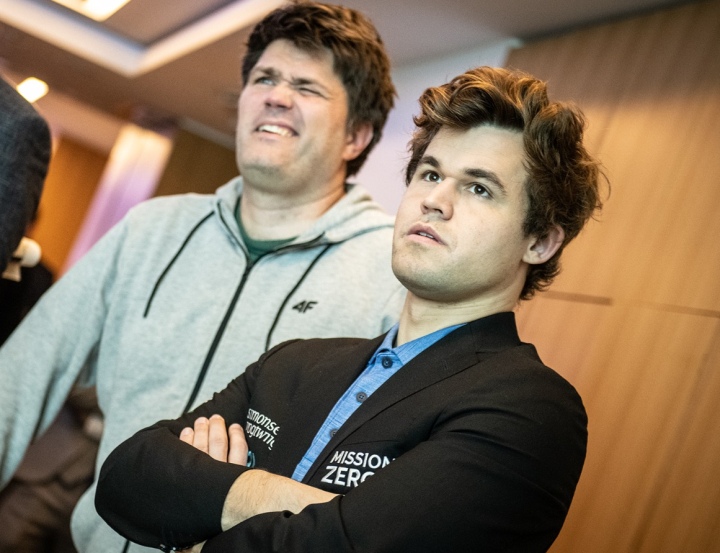The Women’s Candidates Tournament (Pool A) kicked off at the glamorous Hotel Hermitage Monte-Carlo with a glittering opening ceremony on October 24.
The first part of the ceremony included a media reception where the journalists had the privilege to spend time with the players, asking them questions and taking photos in playing conditions.
A lot of special guests attended the ceremony, and various of them had the opportunity to give inspirational speeches. It was especially the case with Dana Reizniece-Ozola, FIDE Management Board Deputy Chair, who stated that Monaco was the perfect place to celebrate the “intelligence and the beauty of women in chess”.
Emmanuel Van Peteghem, secretary of the main sponsor of the event, the SBM company, added that they were very proud to support the chess discipline. Jean-Michel Rapaire, president of the Monaco chess federation, affirmed that it was a pleasure to organize once more an international tournament of this calibre in Monaco.
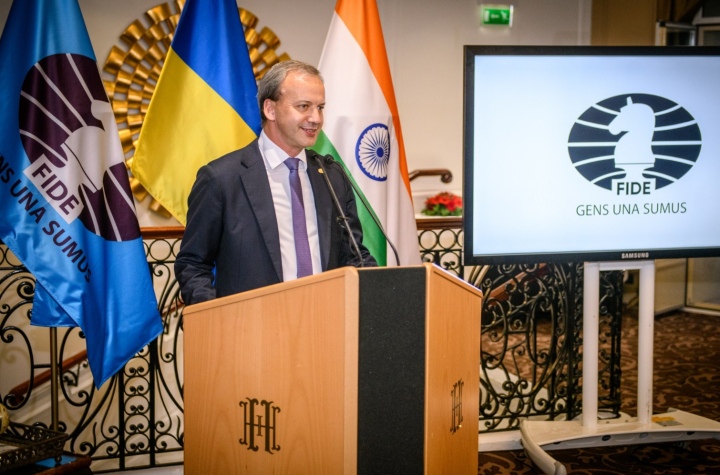
Inna Bazhenova, another cornerstone of the event, based her intervention on the comparison between chess and art and finally, Arkady Dvorkovich, FIDE President, announced the start of the tournament, insisting on the fact that the event “will be interesting for the entire world” since the field involves players from Europe and Asia.
The drawing of colours was as chic as the place where it happened. The players opened Fabergé like exquisite pearl eggs to reveal the queen chess piece, which indicated the colour. Humpy Koneru and Lei Tingjie will start with White against Anna and Mariya Muzychuk, respectively.
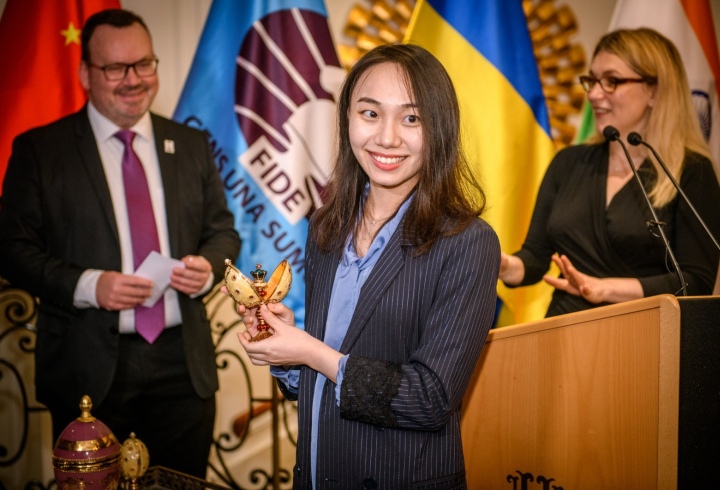
Below you can also find a schedule for the event, as well as a short profile of each of the participants in this pool.
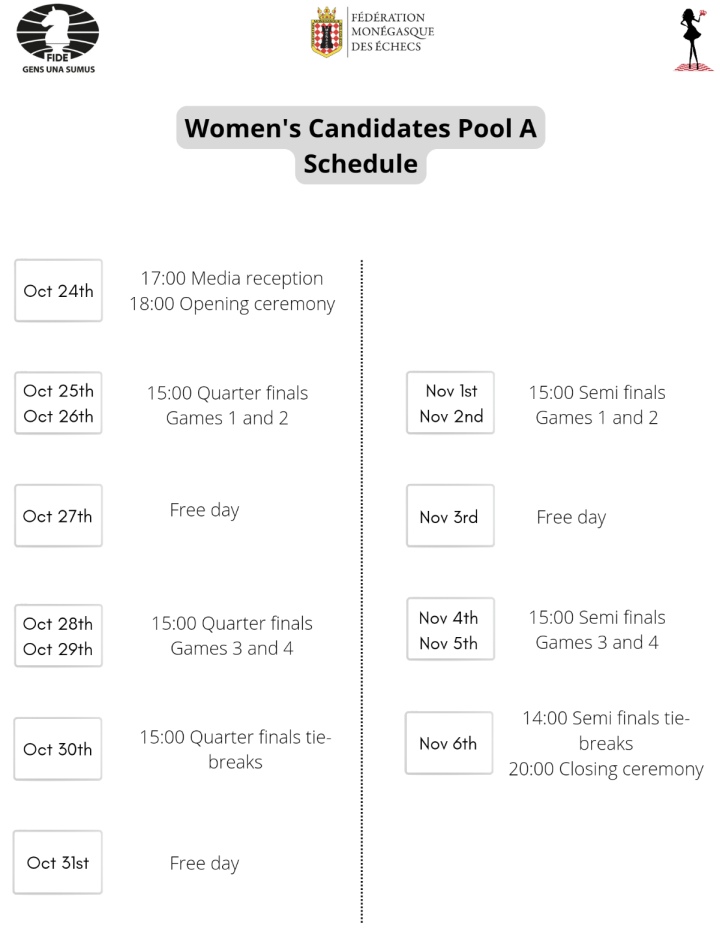
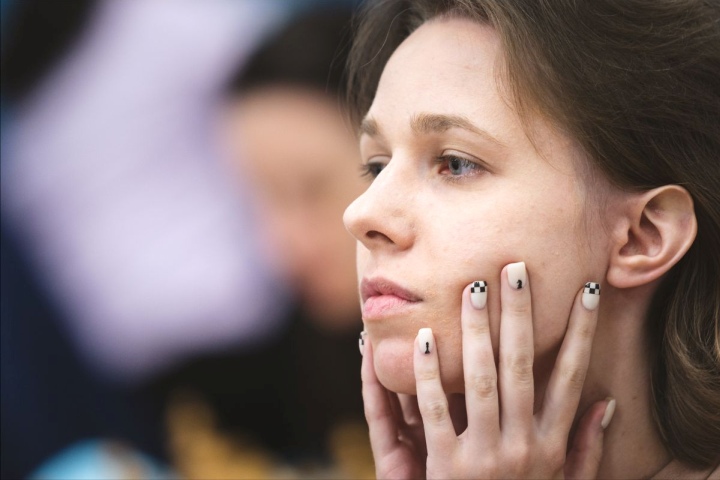
Mariya Muzychuk
Born September 21, 1992
Federation: Ukraine
Rating: 2530
Mariya Muzychuk was the Women’s World Champion in 2015-16 and reached the semi-finals in the Women’s World Championship in 2018. She earned her spot for the Women’s Grand Prix 2022-23 thanks to her 4th place in the FIDE Grand Swiss 2021 held in Riga.
Mariya was born on September 21, 1992, in Stryi, Lviv Region, Ukraine. She started her chess career in the village of Ugersko, where her parents used to work at a local sports school for children and youngsters. However, Mariya managed to train at home, too: her elder sister Anna used to help her along with her parents.
Since she was 7, Mariya has participated in the Ukrainian youth championships; in 2002, she won the Ukrainian and European championships for children under 10. At the age of 11, Mariya was shortlisted for the Ukrainian women’s championship, then she won the world youth championship for children under 14 and later repeatedly won medals at the European and world youth championships.
Her success at the European women’s championships brought Maria the title of women’s grandmaster, and in 2008 she was awarded the title of International Master. After taking her first serious steps into professional chess, Muzychuk was admitted to the Ukrainian national team (while her elder sister was playing for Slovenia); as a member of the Ukrainian national team, she was the silver medalist (2018) and a three-time bronze medalist (2012, 2014, and 2016) of the Olympiads, as well as the women’s World and European (2013) champion as a member of the Ukrainian team. Moreover, she won the gold medal at the 2018 Olympiad holding the best result on the second board. She is a two-time Ukrainian women’s champion (2012 and 2013).
Muzychuk got her moment of glory in the 2015 knockout World Women’s Championship in Sochi: after outplaying Yuanling Yuan, Monika Socko, Antoaneta Stefanova, Humpy Koneru, Harika Dronavalli, and Natalija Pogonina one by one, the Ukrainian grandmaster became the fifteenth Women’s World Champion. In March 2016, Mariya Muzychuk failed to defend her title in a match against Hou Yifan, China.
In 2014, Mariya Muzychuk won the first women’s prize at a prestigious Gibraltar Open tournament. Her beginning of this year has been fruitful: she won the second women’s prize in the same tournament, demonstrating an impressive performance with the score of 2718 points.
Mariya Muzychuk holds the honorable FIDE Caissa award as the best women’s chess player in 2015.
At the FIDE Women’s Candidates Tournament 2019 (Kazan, Russia) Mariya Muzychuk was the only woman chess player to defeat the tournament’s winner, Aleksandra Goryachkina, with their match game having been awarded the special prize for being the most beautiful game of the tournament.
Like many other Ukrainian players, Mariya had to reallocate abroad since the start of the war, and for the last months, she has been living with her sister in Valencia, Spain. Despite the added difficulties, Mariya successfully defended the first for Ukraine at the Chennai Chess Olympiad, leading her team decisively contributing to a historical gold medal.
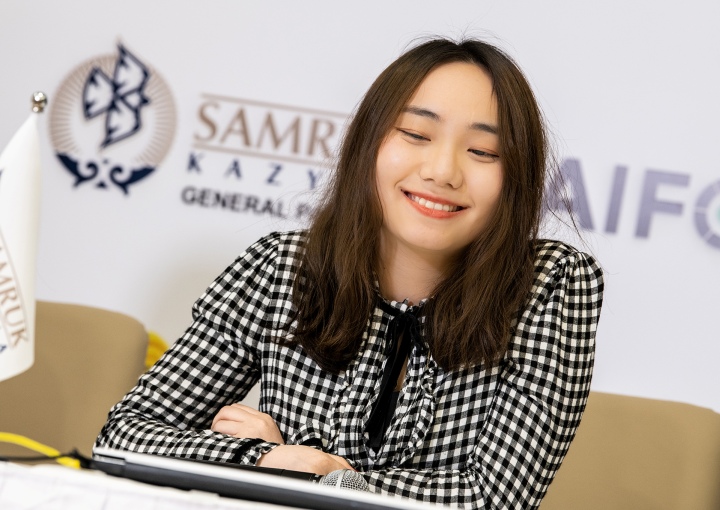
Tingjie Lei
Born March 13, 1997
Federation: China
Rating: 2535
Throwback to the FIDE Grand Swiss 2021 in Riga, round 10: after making a draw against Mariya Muzychuk, the leader of the women’s event Lei Tingjie became the winner of the competition with one round to spare (!!) and qualified for the FIDE Women’s Candidates Tournament. This huge achievement is certainly the peak of her career, at least for now…
Lei was born on the 13th of March 1997 in Fuling District, an area in Chongqing. The municipality of Chongqing, roughly the size of Austria, includes the city of Chongqing as well as various discontiguous cities. It is located in the Southwest of China.
In 2014, at the early age of 17, Lei won the 4th China Women Masters Tournament in Wuxi on a tie-break from Ju Wenjun and was awarded the title of Woman Grandmaster (WGM) by FIDE. This was the rocket launch of her very impressive international career.
In 2015, she won the women’s open event of the Moscow Open, ahead of World Junior Girls Champion Aleksandra Goryachkina (playing in the B Group of the Women’s Candidates).
Lei has very convincingly represented team China on various occasions and just to mention the two most outstanding performances, she was part of the gold medal-winning Chinese female team in 2016 Asian Nations Cup in Dubai and in 2018 Olympiad in Batumi.
Lei is also excellent in shorter time controls. Indeed, in December 2016, she took the silver medal in the Women’s World Rapid Chess Championship in Riyadh. Finally, at the age of 20, in 2017, she clinched the “Sacred Graal” of chess, the Grandmaster Title, which seemed more like a milestone for her.
Recently, Lei has not played in any single FIDE-rated event since the FIDE Grand Swiss. No doubt that after such a performance, one needs to digest it and to prepare for probably the most important tournament of their career so far, the Woman Candidates. Being the youngest and therefore the less experienced player, she will certainly try to make the best of her first participation in an event of this caliber.
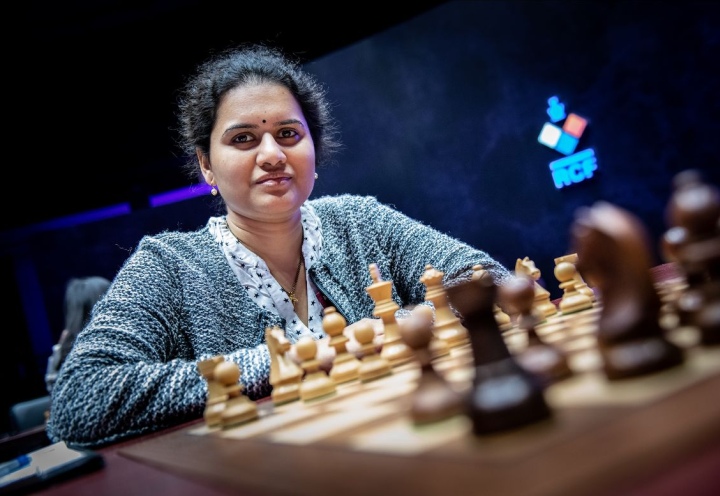
Humpy Koneru
Born: March 31, 1987
Federation: India
Rating: 2574
Humpy Koneru became a chess star from a very young age, and one of the first great Indian talents to emerge after Vishy Anand. Koneru’s father was a strong chess fan himself, rated around 2200. Both her parents supported her passion for chess from a young age, so much so that they even named her “Hampi” (transcribed later on as “Humpy”) as a variation from “champion”.
The list of her achievements at junior competitions is staggering. She won gold medals at the 1997 World Youth Chess Championship (U10 girls), 1998 (U12 girls), 2000 (U14 girls), and 2001 (under 20). She also tied for first in the 2002 World Junior Championship, but on that occasion, the gold went to Zhao Xue, who had a better tie-break.
Humpy won the British Women’s Championship in 2000 and in 2002, and the Indian Women’s Championship in 2003.
In May 2002, Koneru achieved her 3rd GM Norm in the Elekes Memorial Grandmaster tournament in Budapest to become the youngest woman at the time to become a grandmaster. With just 15 years, 1 month and 27 days, she broke Judit Polgar’s record. Only Hou Yifan was able to improve this mark some years later.
In 2004, she decided to participate in the open section of the 2004 World Junior Championship. The victory went to her countryman Pentala Harikrishna, but Koneru’s result, tying for 5th, was nothing short of impressive, especially taking into account that she was only 17, and most of the field was 2 or 3 years older than her.
That same year, Humpy was very close to honouring her name when she reached the semi-finals in her first participation in the Women’s World Championship. She would reach a similar result again in 2008 and 2010.
In 2011, Humpy won the FIDE Grand Prix series and qualified for a match against Hou Yifan. Once again Koneru got a shot at the title, but in the match in Tirana Hou Yifan was at her prime, and the victory went to the Chinese with a favourable score of three victories and five draws.
At the 2015 world championship in Sochi, Koneru made it to the quarterfinals, where she was defeated by the future champion Mariya Muzychuk in the tie-break. Having won pretty much everything else, the World Championship title is the only accomplishment that has eluded Humpy so far – something that she is very ear to fix.
In 2017 Humpy gave birth to her daughter Ahana, which led to a two-year break from competitive chess. She made a very strong comeback, winning the Skolkovo leg of the Women’s Grand Prix 2019-21, the 2020 Women’s World Rapid Chess Championship, and the 2020 Cairns Cup. More recently, she led the Indian women’s team at the Chennai Chess Olympiad, where they achieve the Bronze medal.
Humpy Koneru holds some of the most prestigious awards in her homeland. In 2003 she was awarded the Arjuna Award, which is given to winners of sporting competitions by the Indian Ministry of Sport. In 2007, she was awarded the Padma Shri (the fourth-highest civilian award in the Republic of India) for her contributions to sports.
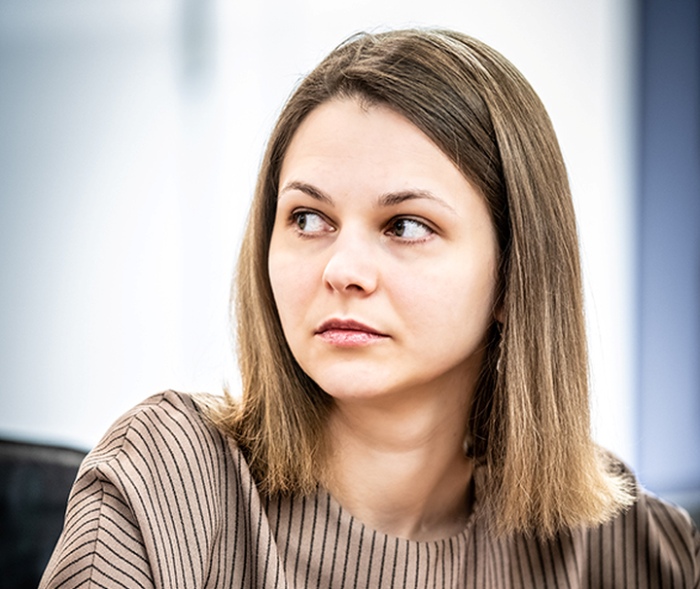
Anna Muzychuk
Born: February 28, 1990
Federation: Ukraine
Rating: 2526
Anna Muzychuk is the fourth woman in history to reach 2600 Elo points. She collected all possible ranks in rapid and blitz chess, and she is also the 2017 World vice-champion. She finished 7th in the previous edition of the Women’s Grand Prix, and she qualified to the current one thanks to reaching semi-finals in the FIDE Women’s World Cup 2021 in Sochi.
Anna was born on February 28, 1990, in Stryi, Lviv Region, Ukraine. Her parents, chess candidate masters, were coaches conducting classes at a local sports school for children and youngsters in the adjacent village of Ugersko. They made little Anya familiar with the game; a bit later, her younger sister Mariya started playing, too.
Anna Muzychuk took medals and first prizes in many world youth championships and won as many as five European youth championships. At the age of 12, Anna became an international master and two years later, a grandmaster. In 2003, she won the Ukrainian women’s championship and repeated that achievement in 2014.
Between 2003 and 2014, she represented the Slovenian Chess Federation in the international arena and then returned under the Ukrainian flag. She is World Women’s Junior Champion (2010), Two-Times World Blitz Champion (2014, 2016) and World Rapid Champion (2016). When playing on the first board of the Ukrainian national team at the World Chess Olympiad, she won silver in 2018 and twice received the bronze award (2014 and 2016). In 2016, she also won the gold for the best result on the first board.
In the 2017 World Women’s Championship, A. Muzychuk made it all the way to finals, where she lost to the Chinese chess player Tan Zhongyi in a persistent struggle.
At the end of the same year, Anna Muzychuk decided to boycott the World Rapid and Blitz Championship in Saudi Arabia despite being the current women’s champion in these two disciplines. Her Facebook post on the subject broke all records in the Ukrainian sector of that social network: it collected more than 160,000 likes and was shared by more than 70,000 people.
“The age gap between me and my sister Mariya is two and a half years. Those who know us say that we’re totally different. She is fast and I’m calm. But we’re on really good terms. We practice together, never conflict, we just argue a little bit sometimes. A few times we played against each other in the rapid chess competitions, but I don’t want to compete with my sister” (A. Muzychuk).
Anna Muzychuk holds the honorable FIDE Caissa award as the best women’s chess player in 2016.
In June 2019 Anna Muzychuk took second place at the FIDE Women’s Candidates Tournament (Kazan, Russia).
Like her sister, she has been based in Valencia (Spain) since the war broke out. She defended the second board of the Ukrainian team that won the Chennai Chess Olympiad.
OFFICIAL WEBSITE: womenscandidates.fide.com
Photo: David Llada, Michał Walusza and Lennart Ootes
ORGANIZERS:

PARTNERS:

